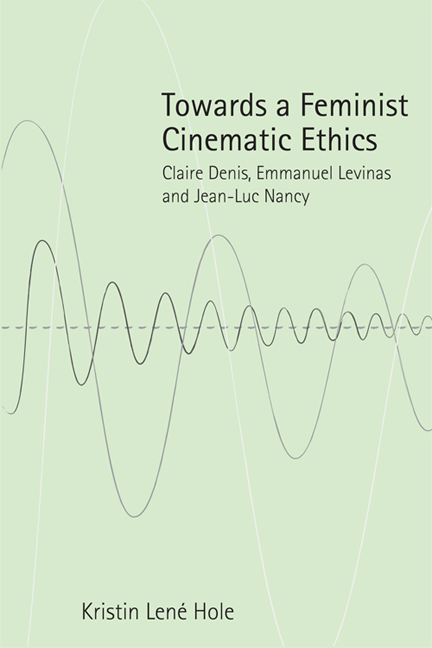Book contents
- Frontmatter
- Contents
- List of Figures
- Acknowledgements
- 1 Encounters, Intrusions: Denis, Levinas, Nancy
- 2 Film Interrupted: Denis, Nancy and an Ethics of Sense
- 3 Otherwise than Hollywood: Denis, Levinas and an Aesthetic of Alterity
- 4 Troubling the Body: Trouble Every Day, Dance and the Non-Mythic Body
- Coda
- Bibliography
- Index
Coda
- Frontmatter
- Contents
- List of Figures
- Acknowledgements
- 1 Encounters, Intrusions: Denis, Levinas, Nancy
- 2 Film Interrupted: Denis, Nancy and an Ethics of Sense
- 3 Otherwise than Hollywood: Denis, Levinas and an Aesthetic of Alterity
- 4 Troubling the Body: Trouble Every Day, Dance and the Non-Mythic Body
- Coda
- Bibliography
- Index
Summary
Our disposition towards the world – the mode in which we encounter it, the stories we tell ourselves about who we are within it, and how we share this world with others – shapes and is shaped by our affective attachments. It has been my aim to offer a generative set of thoughts by putting Denis, Levinas, Nancy and others into a conversation that I have argued offers one useful way to think about the ethical in relation to cinema. This is by no means the one ‘true’ path or the sole means to shift our sensibilities. I have made explicit the metaphysical imaginaries that inspire what I have termed a feminist cinematic ethics – part of which has been an ethics of sense and another part an aesthetic of alterity. These film-based ways of approaching the world both reflect and attune us to a shared vulnerability and responsibility.
The way in which affect shapes the encounter with a film or a philosophical text is central to what has been discussed. Shifts in thought or ways of perceiving often occur through an author's rhetorical strategies or the affective resonances that a text carries for a given reader, or a film for a given viewer. The notion of ‘affective reorientation’ which I borrow from Christopher Janaway's writing on Nietzsche is useful in this regard. Through his reading of the German philosopher, Janaway emphasises the affective forces that shape our moral judgements, often unreflectively. The notion of affective reorientation further highlights our susceptibility and exposedness – to written texts and to films, both of which play a role in shaping the modes in which we encounter others. Denis, Levinas and Nancy all challenge our affective orientations in the attempt to ask us to think differently about the world.
Levinas's hyperbolic, almost sadistic demand for infinite and unending responsibility may be alienating or compelling to the reader. The rhetorical style and difficulty of his texts challenge the Western reader who is perhaps used to thinking of ethics in terms of cultivating virtues or developing strategies for judging between competing claims.
- Type
- Chapter
- Information
- Towards a Feminist Cinematic EthicsClaire Denis, Emmanuel Levinas and Jean-Luc Nancy, pp. 159 - 160Publisher: Edinburgh University PressPrint publication year: 2015



